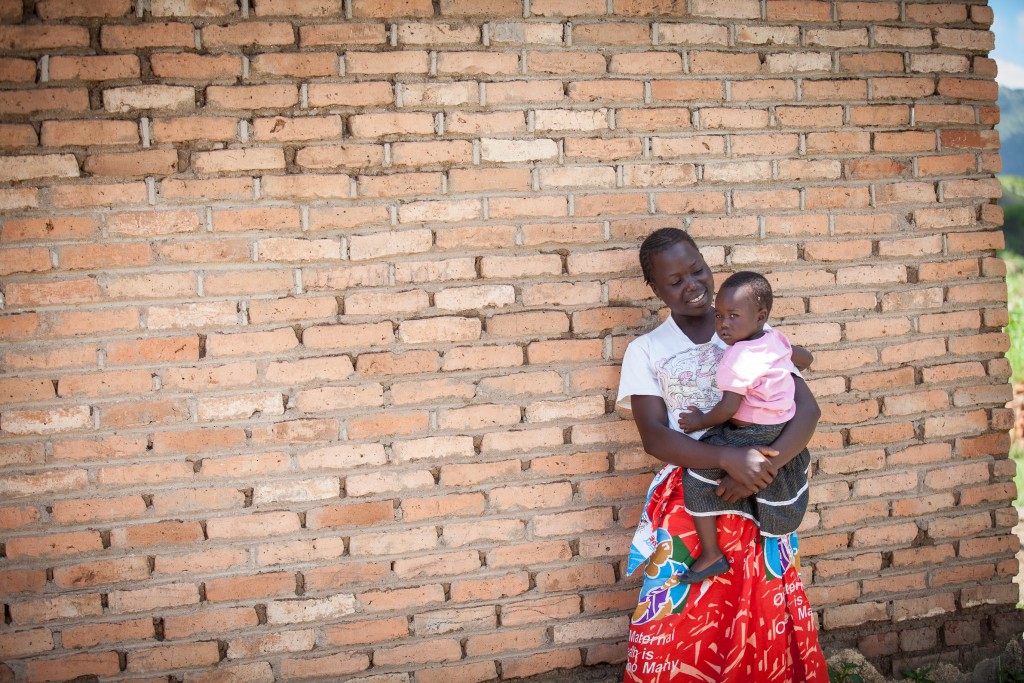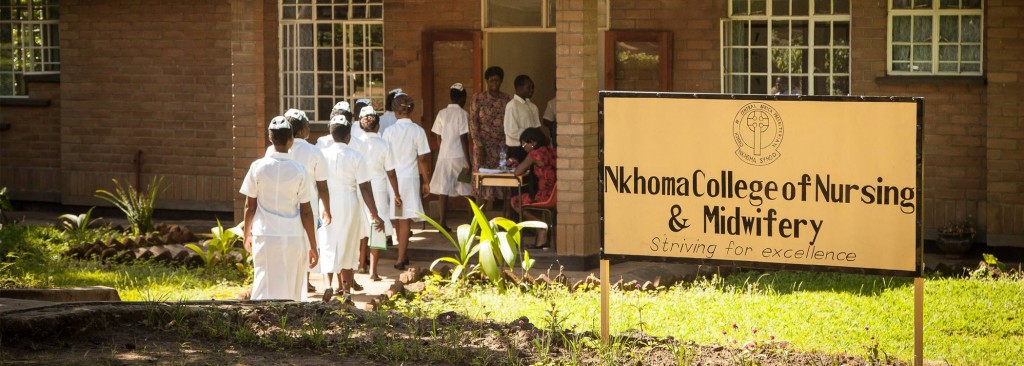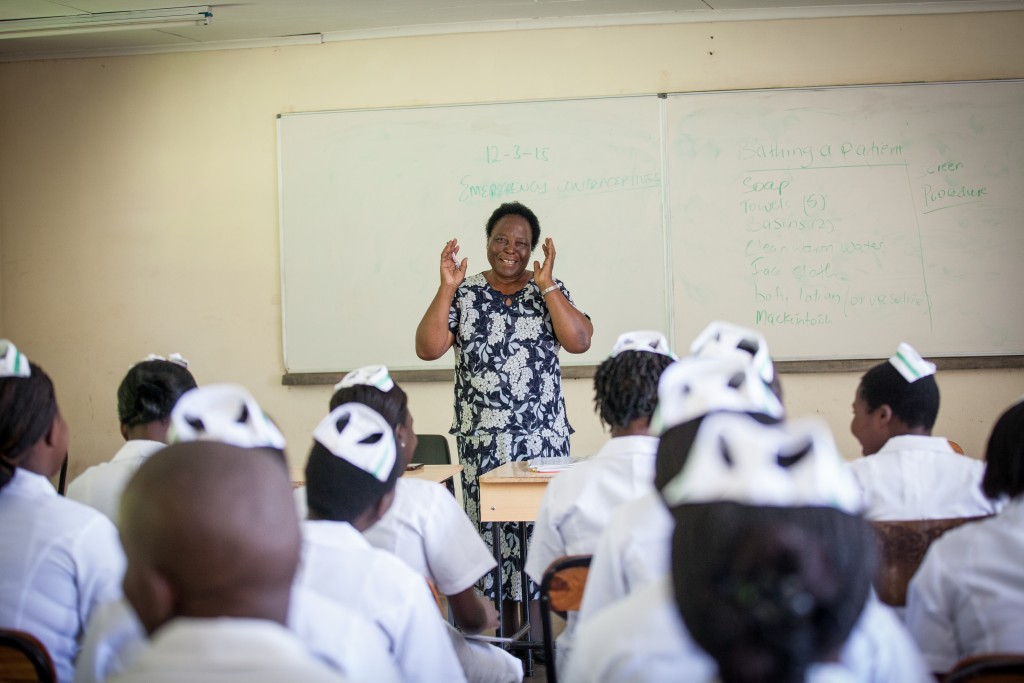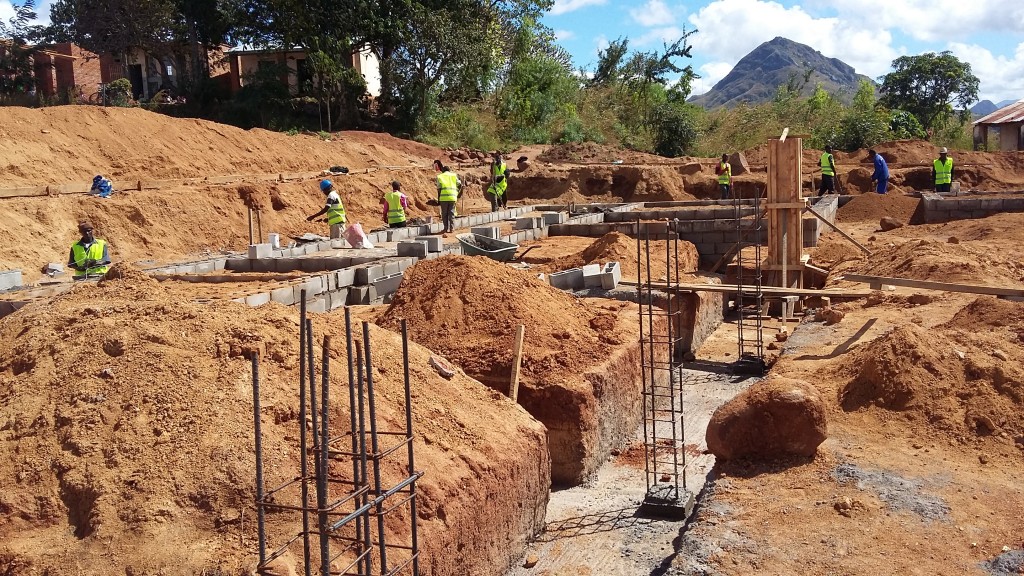Mwai Banda, an 18 year-old woman from Chigodi village in Kasungu District, Malawi has traveled 60 kilometers to be interviewed for a Community Midwife Assistant (CMA) training program. Mwai holds a Malawi School Certificate of Education and has always dreamt of working to improve health in her community. “There are a lot of problems in our community concerning health; distance to health services is one of those. People are suffering a lot, especially pregnant women,” she said. “We only have two nurses who are based at Santhe Health Center, very far away from our village. These nurses also attend to other patients, which makes it difficult for them to fully dedicate their efforts and time to maternal health.”
Mwai Banda during her selection interview to become a CMA in Kasungu
As she awaits the results of the CMA selection process, Mwai mentors young girls from her community who are still in secondary school and encourages them to work hard in school. She hopes that with this opportunity to study Community Midwifery, she will be able to continue to serve her community by enabling young girls and women to access family planning services.
Young women waiting for their interviews to be selected for the CMA course, Lilongwe district
Improving maternal and child health through the CMA program and other initiatives is a priority for the Government of Malawi. In Malawi, where 80 percent of the country’s 16 million people live in rural areas, access to health care services poses serious challenges. Inadequate numbers of skilled birth attendants in rural areas contribute to high rates of preventable deaths among mothers and newborns every year, estimated at 574 maternal deaths per 100,000 live births, and 29 newborn deaths per 1,000 live births. Additionally, access to family planning services is limited, often due to distance and human resource gaps. Women in Malawi give birth to an average of 5-6 children in their lives. Improved access to family planning methods would help control population growth, decrease maternal and newborn mortality, and increase contraceptive choice for the women who want it.
Mother and child, Dedza District
In an effort to address these issues and improve health among women and children in Malawi, the Human Resources for Health Program, a joint program of the Ministry of Health, the Clinton Health Access Initiative, Inc. (CHAI), and the Royal Norwegian Embassy in Malawi, was launched in 2013. The program aims to increase availability of emergency obstetric care and access to family planning services by scaling up production of health workers serving as skilled birth attendants across the continuum of care. CHAI is providing scholarships to nurses and midwives, enhancing the capacity of training institutions by expanding lecture rooms and student hostels, and conducting research to explore sustainable models for deployment and retention of nurses and midwives in remote and hard-to-reach rural areas.
To improve targeted production and distribution of healthcare workers, CHAI developed the Workforce Optimization Analysis tool, which has been used by the Ministry of Health to inform human resource for health-related decisions. In 2014, the tool indicated a gap in healthcare workers in Malawi, and specifically for four cadres: nurse midwife technicians, medical assistants, pharmacists, and lab technicians (gaps of 1,612, 1,493, 854 and 854 workers were recorded, respectively). To reduce these gaps, the program aims to train and deploy 725 nurse midwife technicians and 30 registered nurses to act as skilled birth attendants, 26 nurse educators and 55 preceptors in charge of student supervision during clinical rotation, and 600 community-based distribution attendants, 200 health surveillance assistants and 420 CMAs, by the end of the program in 2018. These health workers, supported and trained by the program, will fill 71 percent of the nursing gap in Malawi.
Students arriving in a class at Nkhoma College of Nursing & Midwifery
To achieve these ambitious targets, the Ministry of Health, CHAI, and the Royal Norwegian Embassy have partnered with nine teaching institutions around the country, including Nkhoma College of Nursing & Midwifery located in Lilongwe District, where the program is supporting 90 nurse midwife technicians and 60 CMAs. Students are supported with tuition fees, uniforms, nurse starter packs, Hepatitis B vaccines, licensure examination fees, additional nurse educator’s salary, clinical instruction, and supervision support.
Class at Nkhoma College of Nursing & Midwifery with instructor
To tackle inadequate infrastructure to accommodate for the increased student intakes, several construction projects have been undertaken in those nine teaching institutions supported by the Human Resources for Health Program. To date, two lecture theatres, one skills lab, four hostels and four classrooms have been completed. Currently, a maternity wing is also being constructed at the Chimwawa Health Center in remote Chiradzulu District.
Foundation of the maternity ward at Chimwawa Health Center
“Access to quality maternal and neonatal health care services in Malawi remains a serious challenge for thousands of Malawians,” said CHAI Malawi Country Director Andrews Gunda. “With this project, the Ministry of Health will see an increase in the number of skilled health workers delivering quality basic maternal obstetric and newborn care, deployed in areas where mortality and morbidity is the highest while accesses to such services are very limited.”











